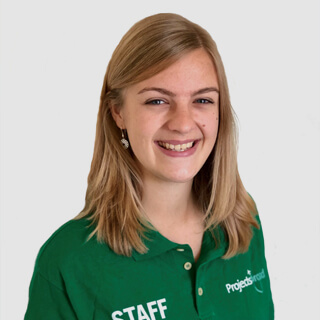It’s 7am on election day in Ghana and my rickety tro-tro (small minibus) passes snaky queues of eager Ghanaians, awaiting their chance to prove that democracy can work in Africa. I pass 35 pesewa to the tro-tro mate and utter something in the local tongue, Twi. The locals always get a kick out of the ‘Obroni’ (white) girl speaking their language.
Peeling myself off the seat, I dismount the bus and wish its passengers good luck – it’s finally the big day! In the lead up to the elections, there had been endless worry among Ghanaians that voting could erupt into violence, like the turmoil seen in Kenya just a year earlier.
Equipped with my own media pass, I weave in between the anxious crowd to take a closer look at the proceedings. Reuters and BBC correspondents stand to my left and European Union observers loiter to my right. It’s an international stage and I’m lucky enough to be in the audience.
I’ve been attached to national newspaper The Daily Graphic for two months now. Based in the effervescent capital, Accra, I began penning stories from day one. Covering anything from road accident statistics to environmental sustainability projects, working as a journalist is such a great way to learn about a country and its people. I bound out of bed at 6am each morning pondering what adventures the day will bring, a far cry from indulgent sleep-ins in Australia. The News Editor also gives me scope to chase my own stories, allowing me to investigate anything from doctor shortages to corruption.
But all my reportage pales in comparison to witnessing the excitement of the elections. Asking my Editor to send me where the action is, I was assigned to the Odododiodio constituency. The densely populated area is considered a ‘flashpoint’ and is therefore under the vigilant supervision of international observers. If the actual place is even half as treacherous as trying to pronounce it, I’m in trouble. After practicing my enunciation and copping taunts from my Ghanaian friends, ‘Odododiodio’ rolls off my tongue like butter!
With a flash of my laminate media pass, I watch as voters enter the booths, press their inky thumbs to the ballot paper and slot their vote into the designated box. Market women waltz past me, grinning from ear to ear and a few young men kick around a dusty football to pass the time. Politics and passion overlap here and Ghanaians young and old relish the opportunity to decide their country’s future.
I dash to the newsroom around midday to file a report of the occurrences so far. The newsroom is surging with journalists maniacally typing stories and receiving updates from regional correspondents. I finish my story and trudge alongside the river back into the thick of the constituency.
As the sun creeps from the sky, the booths close without seeing any of the forecast catastrophes. Ballot boxes are delivered to the collation centre in taxis tailed by police convoys. As the results roll in, impatient locals surround the compound to watch the manual count.
It’s a long, tiring process and the count continues into the early hours of the morning. Battling hunger and pesky mosquitoes, weary journalists scrawl details and radio reporters give live updates to sleepy listeners. When the parliamentary result is finally announced, the remaining hardcore revelers erupt in a cheer, while the opposition slinks home despondently.
Running on adrenalin, I’m caught up in the celebratory buzz. Flags are unfurled and waved wildly while young men dust white powder over their faces to signal victory. As the energy in the air slowly whittles away, members of the Odododiodio constituency dissipate into the night, just as peacefully as they had arrived.
The voters’ poise and perfect conduct will be glorified in tomorrow’s newspaper…

Are you interested in joining this project?
If so, one of our experts can help.
Contact Us on:
This is a personal account of one volunteer’s experience on the project and is a snapshot in time. Your experience may be different, as our projects are constantly adapting to local needs and building on accomplishments. Seasonal weather changes can also have a big impact. To find out more about what you can expect from this project we encourage you to speak to one of our friendly staff.
Our accreditations


















